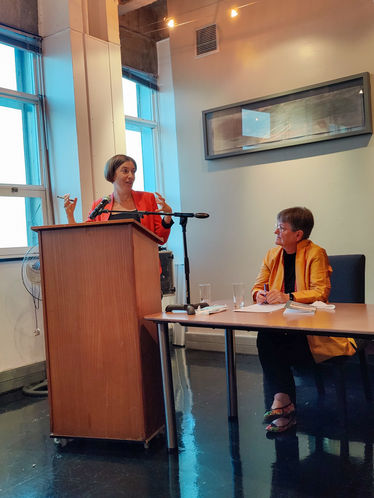Book launches | Isabel Hofmeyr's 'Dockside Reading' and Charne Lavery's 'Writing Ocean Worlds'
15 March 2022
WiSER, University of the Witwatersrand
WiSER, Oceanic Humanities and Wits University Press invite you to a double in-person book launch: Two smart scholars, two superb books, two sharp discussants (and lots of drinks).
Isabel Hofmeyr will discuss Dockside Reading: Hydrocolonialism and the Custom House with Philip Aghoghovwia. Charne Lavery will discuss Writing Ocean Worlds: Indian Ocean Fiction in English with Simon van Schalkwyk.
In Dockside Reading, Isabel Hofmeyr traces the relationships among print culture, colonialism, and the ocean through the institution of the British colonial Custom House. During the late nineteenth and early twentieth centuries, dockside customs officials would leaf through publications looking for obscenity, politically objectionable materials, or reprints of British copyrighted works, often dumping these condemned goods into the water. These practices, echoing other colonial imaginaries of the ocean as a space for erasing incriminating evidence of the violence of empire, informed later censorship regimes under apartheid in South Africa. By tracking printed matter from ship to shore, Hofmeyr shows how literary institutions like copyright and censorship were shaped by colonial control of coastal waters. Set in the environmental context of the colonial port city, Dockside Reading explores how imperialism colonizes water. Hofmeyr examines this theme through the concept of hydrocolonialism, which puts together land and sea, empire and environment.
In Writing Ocean Worlds, Charne Lavery explores the Indian Ocean world as it is produced by colonial and postcolonial fiction in English. It analyses the work of three contemporary authors who write the Indian Ocean as a region and world—Amitav Ghosh, Abdulrazak Gurnah, and Lindsey Collen—alongside maritime-imperial precursor Joseph Conrad. If postcolonial literatures are sometimes read as national allegories, this book presents an account of a different and significant strand of postcolonial fiction whose geography, in contrast, is coastal and transoceanic. This work imaginatively links east Africa, south Asia and the Arab world via a network of south-south connections that precedes and survives European imperialism. The novels and stories provide a vivid, storied sense of place on both a local and an oceanic scale, and in so doing remap the world as having its centre in the ocean and the south.
WiSER, Oceanic Humanities and Wits University Press invite you to a double in-person book launch: Two smart scholars, two superb books, two sharp discussants (and lots of drinks).
Isabel Hofmeyr will discuss Dockside Reading: Hydrocolonialism and the Custom House with Philip Aghoghovwia. Charne Lavery will discuss Writing Ocean Worlds: Indian Ocean Fiction in English with Simon van Schalkwyk.
In Dockside Reading, Isabel Hofmeyr traces the relationships among print culture, colonialism, and the ocean through the institution of the British colonial Custom House. During the late nineteenth and early twentieth centuries, dockside customs officials would leaf through publications looking for obscenity, politically objectionable materials, or reprints of British copyrighted works, often dumping these condemned goods into the water. These practices, echoing other colonial imaginaries of the ocean as a space for erasing incriminating evidence of the violence of empire, informed later censorship regimes under apartheid in South Africa. By tracking printed matter from ship to shore, Hofmeyr shows how literary institutions like copyright and censorship were shaped by colonial control of coastal waters. Set in the environmental context of the colonial port city, Dockside Reading explores how imperialism colonizes water. Hofmeyr examines this theme through the concept of hydrocolonialism, which puts together land and sea, empire and environment.
In Writing Ocean Worlds, Charne Lavery explores the Indian Ocean world as it is produced by colonial and postcolonial fiction in English. It analyses the work of three contemporary authors who write the Indian Ocean as a region and world—Amitav Ghosh, Abdulrazak Gurnah, and Lindsey Collen—alongside maritime-imperial precursor Joseph Conrad. If postcolonial literatures are sometimes read as national allegories, this book presents an account of a different and significant strand of postcolonial fiction whose geography, in contrast, is coastal and transoceanic. This work imaginatively links east Africa, south Asia and the Arab world via a network of south-south connections that precedes and survives European imperialism. The novels and stories provide a vivid, storied sense of place on both a local and an oceanic scale, and in so doing remap the world as having its centre in the ocean and the south.









